Communicate More Effectively
Career Wise Menu
Learn Communication Skills: Express Yourself

- Learn to express yourself in a way that helps you get what you want.
- Learn to avoid common problems with verbal communication in professional settings.
- Learn to use non-verbal communication to help convey your message.
- Learn to avoid common problems with non-verbal communication.
- Learn to bring attention to your needs.
- Learn to manage your professional image.
In communication, the words you choose to convey your message are important, and equally important is the accompanying body language, tone of voice, rate of speech, etc. There is no perfect way to express yourself. Often it comes down to choosing which option will best help you meet your goals.
The key to achieving your communication goals is recognizing how to use verbal and non-verbal messages to best bring attention to your needs. What you choose to say, how you choose to say it, and the way you carry yourself in a conversation can strongly influence the outcome of your interaction.
However, saying nothing, walking away, or avoiding a direct conversation can also influence the outcome of your interactions because avoidance, inaction, and failing to communicate a message are still forms of expression.
This module will help you to bring attention to your needs and manage the nonverbal issues that may influence how your communication is received.
By this time in your life, you have likely fallen into a pattern of expressing yourself that seems natural and doesn’t require a great deal of planning or forethought. Often you may express yourself to share your views with others, ask for something, tell someone what to do or what you expect from them, or to clarify something.
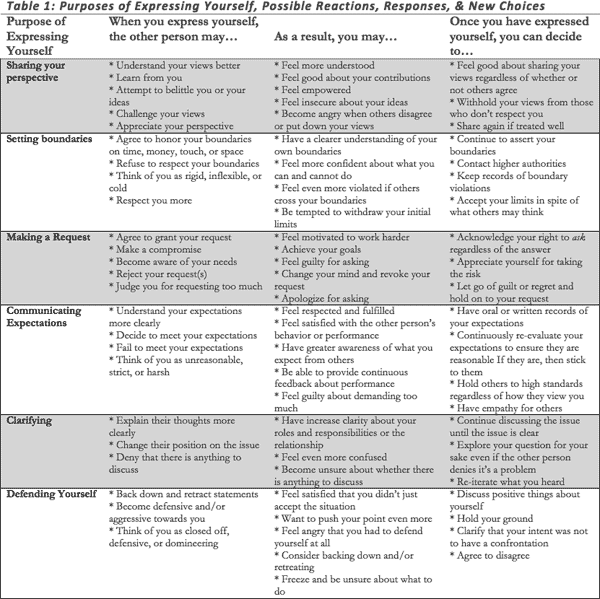
As you can see, the decision to express yourself can be a challenging one, especially when you’re faced with the possibility of getting an unwanted reaction. However, oftentimes the response we most dread is not as bad as we think it might be.
We may not want to be turned down, judged, or rejected, but the long-term costs of not asking for what we want may be greater such as not finishing a graduate program, earning a lower salary, being given fewer opportunities and resources, or in some cases, even inviting the very response we attempted to avoid in the first place. One hypothesis used to explain this phenomenon is that women are socialized to be humble, gentle, considerate, sensitive, and accommodating and, in turn, these qualities may interfere with the decisions required to make demands and express needs or concerns directly (Kugler, Reif, Kaschner, & Brodbeck, 2018)

10 Common Fears about Expressing Yourself
If I share, others will …
- Stop liking me.
- Judge me.
- Criticize me.
- Disagree with me.
- Discredit my ideas or me.
- Insult me.
- Get hurt.
- Argue with me.
- Won’t trust me.
- Think I’m incompetent.
While each one of these outcomes has the potential to occur if you do express yourself, they can also occur if you do not express yourself. In fact, we may be more likely to invite the types of situations mentioned above by not acting because others are left to their own assumptions about us, rather than hearing the facts of how we really think or feel.
Being explicit about your thoughts, reactions, feelings, opinions, and ideas can give you credibility, respect, and clearer boundaries. At a minimum, it will leave less room for others to fill in the blanks with their own assumptions.
Self-test
In order to complete a group research project by the deadline, your team divided the work equally according to team members’ strengths. You are the first to finish your task so your teammates ask you to gather everyone’s information and create a PowerPoint file for the presentation.
They claim to be really busy and say that they don’t have enough time to get it done before it’s due next week. Normally, you would be happy to help the team out with this extra task, but you also have a number of other tasks pending that you worry may not be completed if you create the presentation file.
How can you respond in a way that expresses your needs?
- A. Agree to help them out this time, but state that you want them to help more on the next project.
- B. Explain that you have too much on your plate this week and suggest that Bobby do it instead because he had the shortest section.
- C. Agree to do it but mention all the tasks you’re juggling too so that at least they really appreciate how much you’re doing for the team.
- D. State that you have other stuff you’re working on and that everyone needs to make their own slides or work together as a group to create the PowerPoint presentation
The first things people often notice during communication interactions are non-verbal messages. However, we are often unaware of the nonverbal messages we send to others.
Facial expressions, touch, movement, as well as voice tone, rate, and pitch, or even the physical distance between you and another person are each important parts of non-verbal communication. Most of us may be unaware initially of why we view conversation partners a certain way because our brains are programmed to automatically calculate and decipher non-verbal cues without thought.
Becoming aware of your own non-verbal tendencies and how they may come across is therefore an important part of communicating with others. Your non-verbal messages may be saying something you didn’t intend to convey.
Table 2 depicts various aspects of non-verbal communication that may create confusion or become problematic along with suggestions for alternative behaviors.
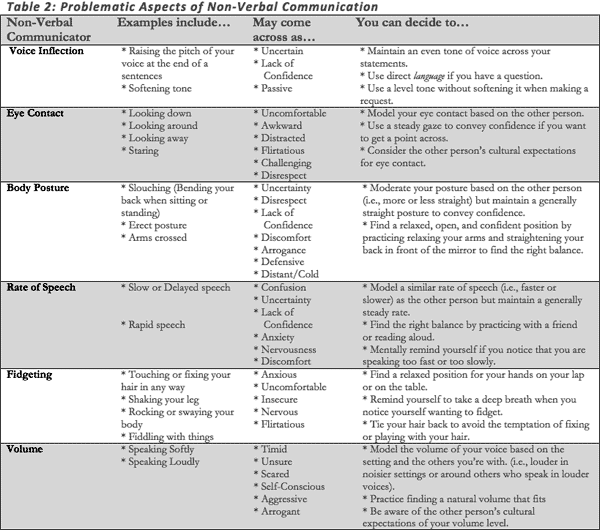
Cultural implications in nonverbal communication
The meaning of various nonverbal cues can become complicated when other cultures have different norms and/or interpretations from yours about expressions and behaviors. Direct eye contact, for example, is highly valued and emphasized in Western culture; it is viewed as portraying confidence, honesty, genuineness, and respect.
However, in some Eastern cultures direct eye contact may be viewed as portraying arrogance, flirtatiousness, disrespect and/or inviting confrontation. This is not to suggest that one should automatically avoid eye contact with people from Eastern cultures, but rather it speaks to the nuances and variations of nonverbal communication across cultures. Being aware that different cultures view the same nonverbal expression differently can help you express yourself in ways that are culturally appropriate and valued by the other person.
Given the multitude of nuanced differences in nonverbal communication across cultures, the best way to learn about these meanings may be to observe objectively the person with whom you are communicating and consider matching their style of nonverbal behavior. For example, you may try speaking in a softer tone of voice with someone who is soft-spoken or attempt to mirror similar, although not exact, eye contact patterns used by the other person in the conversation. If it’s appropriate and if you feel you know them well enough, it also makes sense to simply ask what they prefer.
Most people think of verbal communication as the main channel of communication. However, words can be laden with unintended connotations, implications, innuendo, or double meanings.
Your choice of words can convey data about the content of your message as well as information about you as a person. The impression you make is tied strongly to the ways in which you employ verbal communication.
For example, using overly technical and formal language in more casual settings may give others the impression that you are arrogant, cold, pedantic, or unapproachable. At the same time, using overly informal language in professional settings may make you appear unprofessional, incompetent, inappropriate or even crude.
Table 3 illustrates common problems with verbal communication and suggestions for alternative approaches.
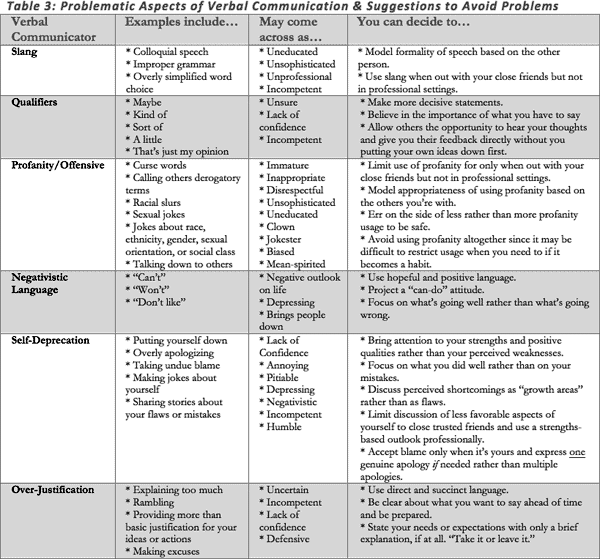
Gender implications in verbal communication
Research shows that women second-guess themselves more than men and doubt whether what they have to say is of value. This same research also shows that society perpetuates this problem by holding women to higher standards than men and giving them less reward for their work (Williams & Phillips, 2016).
Additionally, women tend to externalize success by attributing to an external cause and internalize failure by attributing to an internal cause (LaCosse, et al 2016). Portraying a lack of confidence can weaken your credibility in many situations.
However, showing too much confidence in certain situations may be perceived as arrogant and can jeopardize your relationships. Some women tend to err on the side of expressing less confidence to avoid being labeled as bossy, domineering, or aggressive (Kray & Kennedy, 2017) [see Gender].
Observing yourself and trying out new styles of expression can help you find balance. Without exploring what fits for you, how can you find the appropriate line between arrogance and confidence, or when it’s right to discuss your accomplishments versus remaining silent?
One way is to ask for feedback from others about how you come across, then use this information to help guide future behavior. Another option may be to try something different from what you usually do.
For example, if you avoid verbalizing what you have accomplished, practice mentioning it a bit more often around others gradually and pay attention to how you feel when you do and what effect it has on others’ impression of you.
Four Tips for Expressing Yourself Verbally
- Use “I” statements to explain your experience subjectively and to keep the focus on your own thoughts and feelings. “I feel uncomfortable agreeing to extra hours when my other obligations might suffer” is very different from “You are being unfair by asking me to work longer hours without any regard for my other obligations.”
- Discuss your needs: others will appreciate knowing what you need from them rather than having to guess.
- Focus on what can be done to improve a situation rather than just focusing on problems.
- Be confident and believe in the importance of what you have to say, even when others don’t.
Cultural implications in verbal communication
Different cultures may have varied expectations for women’s communication styles. Choosing to fulfill these expectations comes with both potential costs and benefits. For example, women (particularly women from some cultures).
Aligning your behavior with the expectations others place on you may help to keep the peace but could interfere with your long-term life and job satisfaction and self-respect. It could also further limit upward mobility since women have the predicament of balancing being womanly enough with not being perceived as too feminine or too aggressive to get ahead.
Ultimately, these choices lead to the development of our professional image. Regardless of what you have decided in the past, at any point you can choose to make new choices for your future.
Have you ever seen someone who is so mad that they started laughing or so happy that they started crying? In those instances you may have felt confused and unsure about how to respond. This is because our brains are trained to automatically interpret both verbal and nonverbal cues simultaneously. Conflicting information can oftentimes interfere with a clear interpretation.
When there are inconsistencies between verbal and nonverbal messages, nonverbal cues carry more weight than verbal cues and become the primary basis for how others make meaning of the interaction.
Table 4 depicts examples of verbal statements paired with both confusing and expected nonverbal responses and how they may be perceived.
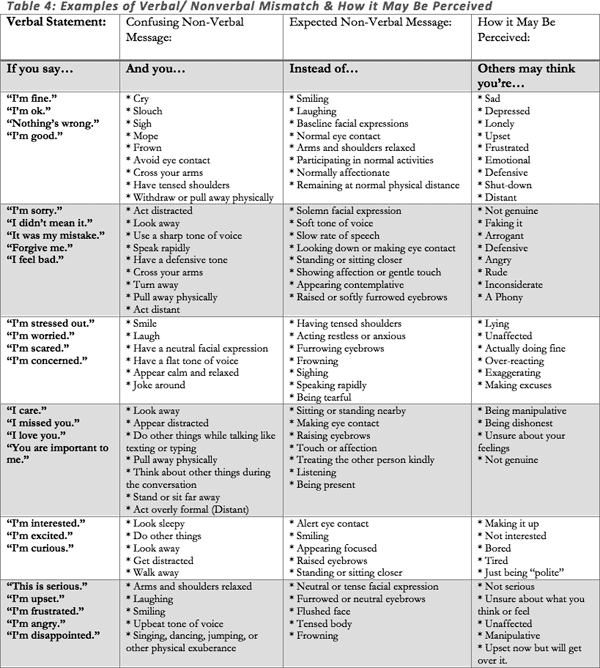
Perhaps the biggest mistake that women make in expressing themselves is never asking for what they want in the first place. Society holds strong expectations for women to be pleasant, friendly, non-confrontational, accommodating, and nurturing.
These expectations operate as early as childhood, and women internalize these expectations as a natural part of their identity. As a result, women may feel uncertain about their worth and reluctant to ask for more than what they currently have.
Fear of rejection can deter women from making their needs clear in relationships. But remember, the worst that could happen is that you are told no.
Five statements to return the attention to your needs:
- This is really important to me.
- I need this in order to …
- Before I can get to_____, I need ______.
- I would really appreciate it if …
- I would like to discuss this, so perhaps we can find a better time.
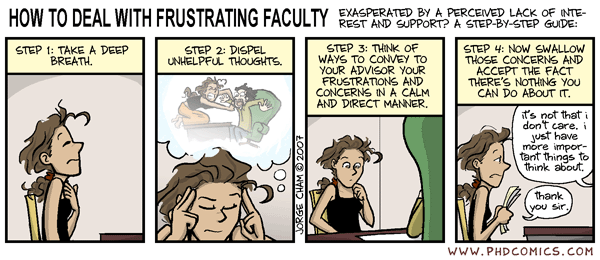
Ten tips on asking for what you want (See Planning the Message for more.)
- Empathize with the other person, but don’t assume you know what they think in advance.
- State your need directly, succinctly, and without apology or explanation instead of implying, suggesting, or being vague about what you want.
- Consider offering a compromise that is well thought-out and takes the other person’s needs into account.
- Plan for external factors like time and context. For example, hold off on making requests during crises or crunch times unless necessary.
- Be prepared for potential barriers and how you plan to address them without becoming discouraged.
- Provide specific and concrete examples of what you want when possible.
- Avoid backing out of your requests. If you retreat, you jeopardize your credibility.
- State your needs prior to making any commitments. This increases your power to negotiate.
- Prepare a back-up plan(s) in case your request cannot be met so you have alternative solutions ready.
- Be reasonable and consider the limitations of the other person.
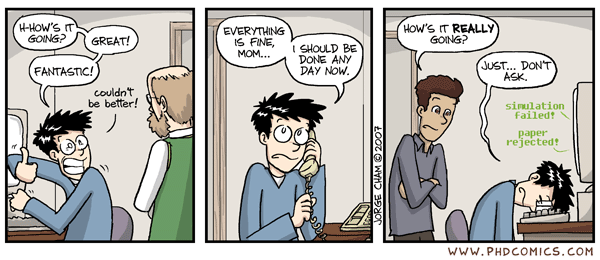
When you’re a woman in a field where you're numerically in the minority it can be difficult to figure out how to portray yourself. Impression management is always important for professional success but takes on a different quality in academia, where we are often more beholden to others in order to achieve our goal (e.g., you can’t graduate without the support of your advisor).
You can’t control what others think of you. Some will view you a certain way regardless of what you do. As a woman, others’ impressions of you are often colored by gender stereotypes and expectations. Taking such gender factors into account poses an additional burden for women in managing impressions.
For the most part, however, your behaviors and how you present yourself play a major role in determining how others perceive you. The way you dress, the people you associate with, the places you go, and aspects of your personal or academic life that you reveal all contribute to the impression you make.
Some people tend to be extremely guarded and maintain only casual and collegial relationships with those in their professional life. The downside is that such caution often means limiting meaningful relationships to those outside of the work setting and missing the socializing and networking that are important to career success.
A person with reserved behavior is often misconstrued as being cold, snobbish, or unfriendly. In another example of the double jeopardy for women, however, being perceived as too expressive can work against you as well.
Table 5 addresses some of these domains and ways to protect your professional image. Keep in mind, however, that there are no definitive guidelines in these areas. They very much depend on your immediate environment and your relationships with the people in it.
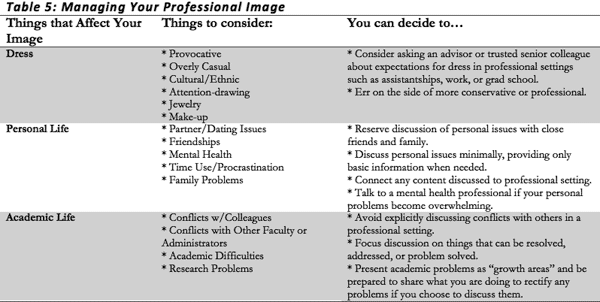
For more on these topics, see The Impression You Make.
Five ways to deflect questions you don’t want to answer:
- I’m not comfortable talking about that.
- I’d rather not get into it.
- I’m sorry, that’s too personal.
- It’s in the past.
- I don’t think that’s appropriate to discuss here.
Sharing aspects of yourself may help you build relationships or connect with others, but it can also be a source of conflict and negative impressions. The key is to make planned and intentional disclosures so that you are aware of what and with whom you are sharing, and what they plan to do with the information.
Social media and your professional image
Maintaining boundaries about what to reveal and being deliberate about what aspects of yourself you want your colleagues or supervisors to know is a fundamental component of being a professional. Be cautious about your public image since many employers now check social media like Twitter and Facebook when hiring new employees.
A good ground rule for practice is to treat these social media environments like an extension of your work persona. When in doubt, ask yourself “How do I want to be seen?” and “How might this come across?” These questions can help increase your awareness and project the persona that will be most respected by others.
How you express yourself is a function of both your verbal and nonverbal messages. When verbal and nonverbal messages in a communication interaction conflict with one another, it introduces confusion that may undermine the message you are trying to convey. Expressing yourself to bring attention to your needs may be one of the more difficult forms of expression, so be mindful of the messages you send.
- Pay attention to the words you are using when expressing yourself and be mindful of the alternative meanings they may contain.
- Take note of your nonverbal behaviors. Do they conflict with your verbal message? Could they be perceived as communicating something unintended? Practice aligning them with your verbal message(s) and take measures to eliminate behaviors that create confusion or portray the wrong impression.
- Remember to consider the impression you’ll be projecting as you decide how to express yourself.
Abrahm, J. L. (2008). Women don't ask: The high cost of avoiding negotiation—and positive strategies for change. Journal of Palliative Medicine, 11(8), 1162-1162. https://doi.org/10.1089/jpm.2008.9845
Carter, A. J., Croft, A., Lukas, D., & Sandstrom, G. M. (2018). Women’s visibility in academic seminars: Women ask fewer questions than men. PloS ONE, 13(9), e0202743. https://doi.org/10.1371/journal.pone.0202743
Catalyst, Inc. (2007). The double-bind dilemma for women in leadership: Damned if you do, doomed if you don't. Catalyst.
Dolan, R. (2017). Branding yourself effective communication skills. Microbiology Letters, 364(2). https://doi.org/10.1093/femsle/fnw289
Dormanen, R., Sanders, C. S., Maffly-Kipp, J., Smith, J. L., & Vess, M. (2020). Assimilation undercuts authenticity: A consequence of women’s masculine self-presentation in masculine contexts. Psychology of Women Quarterly, 44(4), 488-502. https://doi.org/10.1177/0361684320947648
Kim, H. S., & Sherman, D. K. (2007). " Express yourself": Culture and the effect of self-expression on choice. Journal of Personality and Social Psychology, 92(1), 1-11. https://doi.org/10.1037/0022-3514.92.1.1
Kugler, K. G., Reif, J. A., Kaschner, T., & Brodbeck, F. C. (2018). Gender differences in the initiation of negotiations: A meta-analysis. Psychological Bulletin, 144(2), 198-222. https://doi.org/10.1037/bul0000135
LaCosse, J., Sekaquaptewa, D., & Bennett, J. (2016). STEM stereotypic attribution bias among women in an unwelcoming science setting. Psychology of Women Quarterly, 40(3), 378-397. https://doi.org/10.1177/0361684316630965
Lerchenmueller, M. J., Sorenson, O., & Jena, A. B. (2019). Gender differences in how scientists present the importance of their research: observational study. BMJ, 367. http://dx.doi.org/10.1136/bmj.l6573
Pietri, E. S., Johnson, I. R., & Ozgumus, E. (2018). One size may not fit all: Exploring how the intersection of race and gender and stigma consciousness predict effective identity-safe cues for Black women. Journal of Experimental Social Psychology, 74, 291-306. https://doi.org/10.1016/j.jesp.2017.06.021
Prochazkova, E., & Kret, M. E. (2017). Connecting minds and sharing emotions through mimicry: A neurocognitive model of emotional contagion. Neuroscience & Biobehavioral Reviews, 80, 99-114.https://doi.org/10.1016/j.neubiorev.2017.05.013
Salerno, J.M., Peter-Hagene, L. C., & Jay, A. C. V. (2019). Women and African Americans are less influential when they express anger during group decision making. Group Processes & Intergroup Relations, 22(1), 57-79. https://doi.org/10.1177/1368430217702967
Smith, J. L., & Huntoon, M. (2014). Women’s bragging rights: Overcoming modesty norms to facilitate women’s self-promotion. Psychology of Women Quarterly, 38(4), 447-459.https://doi.org/10.1177/0361684313515840
Von Hippel, C., Wiryakusuma, C., Bowden, J., & Shochet, M. (2011). Stereotype threat and female communication styles. Personality and Social Psychology Bulletin, 37(10), 1312–1324. https://doi.org/10.1177/0146167211410439
Wessel, J. L., Hagiwara, N., Ryan, A. M., & Kermond, C. M. (2015). Should women applicants “man up” for traditionally masculine fields? Effectiveness of two verbal identity management strategies. Psychology of Women Quarterly, 39(2), 243-255. https://doi.org/10.1177/0361684314543265
Wilkins, K. G., Bernstein, B. L., & Bekki, J. M. (2015). Measuring communication skills: The STEM interpersonal communication skills assessment battery. Journal of Engineering Education, 104(4), 433-453.https://doi.org/10.1002/jee.20100
Williams, J., & Phillips, K. (2016). Tools for change: boosting the retention of women in the STEM pipeline. Journal of Research in Gender Studies, 6(1), 11–75. https://doi.org/10.22381/jrgs6120161
Willis, J., & Todorov, A. (2006). First impressions: Making up your mind after a 100-ms exposure to a face. Psychological Science, 17(7), 592-598. https://doi.org/10.1111/j.1467-9280.2006.01750.x
The Importance of Having Positive Working Relationships: A Case Study
The importance of good working relationships and when it's worth putting forth effort.
Emphasizes the joy of being a faculty member.
Promoting Yourself to Your Family
Advises how to keep family informed about research goals and progression from student to faculty member.
Becoming an Independent Voice as a Young Faculty Member
The process of establishing yourself in the same department as your spouse.
Suggestions for defining research.
On Speaking Up: A Conference Experience
Confronting a male colleague with contradictory findings at a conference.
Highlights the obstacles faced when trying to have research reviewed by the advisor and emphasizes the steps necessary to make adequate progress in the program.
The importance of being open and honest with your advisor
Communicate Effectively
Explains that satisfaction comes from working with students and the opportunity to make new disco
Explains that satisfaction comes from working with students and the opportunity to make new disco
The importance of learning from mistakes and persisting despite setbacks.
The importance of learning from your effort, regardless of the outcome.
Advice on how to seek out support in graduate school and how to bounce back from setbacks.
Shares the excitement that comes from collaborating with others to make new discoveries.
Elaborates on the standard practice of science despite cultural differences.
Strategies for negotiating as a faculty member.
When it's time to graduate and when it's important to start learning on the job.
Highlights the transition into graduate level science where the answers aren't known.
The importance of goal setting and using others' experiences to make strong choices about your own p
Advice for balancing research and fun in graduate school.
Advice for students: stay focused, ask questions, and remain open-minded when working with others.
How to adapt experimental methods to match a lifestyle.
How to negotiate a schedule for raising a family and overcoming setbacks in a new career.
The importance of giving yourself credit and remembering why you are doing what you're doing.
The importance of peer relationships and the learning process that takes place despite concrete outc
Working with graduate students is a rewarding aspect of being a faculty member.
Advice for graduate students on how to maintain their confidence, courage, and dignity.
Emphasizes peer relationships and departmental climate.
How to handle being accused of having an affair with the advisor.
Explains an interdisciplinary branch of physics and the passion for research, service, and teaching.
Teaching as the impetus for work.
Discusses necessary precautions to take as a female student working late nights on campus.
Discusses necessary precautions to take as a female student working late nights on campus.
Being accused of cheating and regrets about not being more assertive.
Being accused of cheating and regrets about not being more assertive.
The importance of self-authorship and using graduate school as a process for self-definition.
Reminder that support can be found in unexpected places.
Urges female graduate students to persist in the field of mathematics because the field needs divers
How being unaware of being the only woman was advantageous to program success.
Alternatives to departmental isolation and the importance of networking.
Environmental issues faced in academia.
The importance of first impressions in choosing a graduate program.
Satisfaction comes from interacting with intelligent people across cultures.
Adjusting physical appearance to fit in with peers.
The importance of remembering that graduate school is only one part of a larger career.
Describes an incident of receiving a lower grade than a man for similar work.
The opportunity for freedom, growth, and collaboration as a faculty member.
How to survive the aftermath of a sexual harassment incident.
Highlights the gendered assumptions encountered as a faculty member.
The Importance of Having Positive Working Relationships: A Case Study
An alternative way to approach being the only woman in a given situation.
Contributions to the field are reflected through choices.
The importance of sharing stories of sexual harassment with others to gain support.
The importance of finding the right advisor to support your research goals.
How to handle being accused of having an affair with the advisor.
Explains when to confront a problem and when it may be better to maneuver around it.
How to be upfront, direct, and assertive when confronting instances of sexual harassment.
Highlights the universal customs of science.
Class performance builds confidence to remain in program.
Captures the annoyance of male colleagues making sexist assumptions and the challenges with conferen
The importance of recognizing the progress that has been made by women in science fields.
Advice for accomplishing your academic goals without making unnecessary compromises.
Emphasizes the challenge with saying no, but the importance of learning to do so.
How to make friends with colleagues to encourage a supportive environment.
Underscores the challenges that come from being the only woman in an academic department and gives s
Highlights an experience in which peers were not only colleagues, but also friends.
How the physical space in a laboratory allowed for collaboration among colleagues.
The importance of a good leader in setting standards for diversity, climate, and tenure policies.
How to observe others' reactions to subtle comments in order to gauge an appropriate response.
Urges students not to get wrapped into issues that do not directly involve them.
Departmental reactions to the choice to have children.
How to refute sexist comments and challenge gendered assumptions.
The importance of sharing stories of sexual harassment with others and realizing that you are not al
Confronting a male colleague with contradictory findings at a conference.
How colleagues can assist in making the transition into graduate life easier by sharing information
Captures the small but noticeable annoyances that come with being the only woman.
The importance of picking your battles to avoid unfair labeling.
Reminder that it is not necessary to feel comfortable socially to do good science.
Gender stereotypes faced in getting into graduate school and conducting research.
How to seek support from administrators outside the department when dealing with departmental sexism
The first realization that being a woman in science was outside the norm.
Challenges of being international and female, particularly with regards to an academic career and th
Suggestions for how to deal with sexist comments.
Playing a variety of roles as the only woman in the department.
The process of establishing yourself in the same department as your spouse.
Emphasizes positive peer relationships within her cohort.
The challenges of working in male-dominated academic environments and the negative stereotypes assoc
The feasibility of pursuing a family and science.
The importance of hearing other people's stories.
The importance of understanding priorities and allocating resources accordingly.
Advises how to keep family informed about research goals and progression from student to faculty mem
Explains some of the setbacks in dating relationships.
Advises students to continue to pursue their education because the payoff is self-respect.
The importance of believing in yourself, admitting your mistakes, and continuing to do what you love
How to accept non-traditional relationships and lifestyles in academia.
Notes the challenges of a dual career marriage and the obstacles in fighting for tenure and balancin
The process of overcoming setbacks related to career options and personal relationships.
How to balance motherhood responsibilities in graduate school.
The importance of supportive peer relationships.
Being married in graduate school and having children as a faculty member.
Advisor's experiences encourage well-informed career decisions.
The importance of a supportive network of colleagues.
Doing something useful to make a difference and how to appreciate a happy, supportive work environme
Taking time off before pursuing her PhD.
How a supportive department and a modified teaching schedule allowed for maternity leave.
How to sustain taking time off and pursuing the PhD later in life.
Advises how to keep family informed about research goals and progression from student to faculty mem
The importance of a supportive extended family in helping to balance school and children.
The importance of having a number of things in your life that bring you joy and satisfaction.
Understanding your strengths and weaknesses, but ultimately giving yourself recognition for your suc
The importance of learning over time and remaining positive in the face of criticism.
Motivation for doing work: interacting with students and doing research that can make a difference i
Emphasizes the challenge with saying no, but the importance of learning to do so.
The importance of remaining passionate and remembering that the PhD opens doors.
The importance of defining clear goals, remaining self-confident, and learning to say no.
The importance of allowing yourself the opportunity to change your mind and reconsider your goals.
The importance of knowing what you want and expecting tradeoffs on the path to get it.
Making discoveries and collaborating with others brings satisfaction.
Creating a schedule and meeting an advisor's expectations.
Advises graduate students to take a semester off if they choose to have a child because it is too ch
Explains the role children play in career choices.
Using leisure activities to relieve stress and build friendships.
The satisfaction that comes from working with colleagues and interacting with others.
The decision to get married in graduate school.
The importance of maintaining a balanced lifestyle to alleviate stress.
Addresses personal relationship sacrifices.
The importance of nurturing relationships outside of academia.
Explains the choice to have children in graduate school.
Challenges with being married to a fellow academician and finding faculty positions.
How a flexible schedule as a professor made it possible to have a family and a career.
The importance of evaluating your priorities to create balance and happiness.
Appreciation for advisor's assistance in transitioning to the US.
Emphasizes the joy in working with others and giving back to society.
Chronicles the evolution of a career over time.
Suggestions for how to increase women's participation in science with an emphasis on policy change.
The importance of being open and honest with your advisor.
How a positive advisor challenged his students to think for themselves.
Highlights the obstacles faced when trying to have research reviewed by the advisor and emphasizes t
The importance of having a variety of mentors throughout your graduate experience.
Challenges faced with establishing yourself as an independent researcher separate from an influentia
The importance of asking questions and searching for creative solutions to new problems.
The importance of finding a good advisor and making sure to get everything in writing.
Challenges in confronting the advisor with news of pregnancy.
Experiences with an international advisor.
How to maintain good relationships with colleagues while being motivated to finish the program qu
The importance of giving back to students and making an impact in their future education and care
An Arizona State University project, supported by the National Science Foundation under grants 0634519, 0910384 and 1761278
Any opinions, findings, and conclusions or recommendations expressed in this material are those of the authors and do not necessarily reflect the views of the National Science Foundation. © 2021 CareerWISE. All rights reserved. Privacy | Legal




Comments
We want to hear from you. Did this page remind you of any experiences you’ve had? Did you realize something new? Please take a moment to tell us about it—and we’ll keep it confidential.